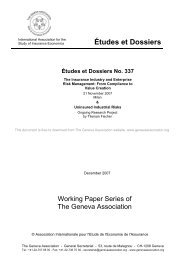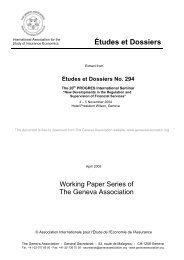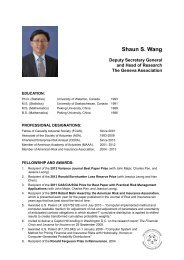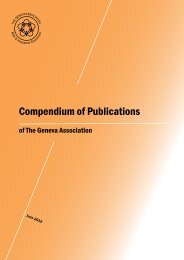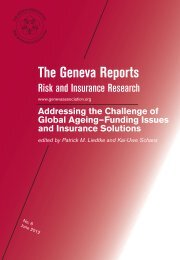Addressing the Challenge of Global Ageing?Funding Issues and
Addressing the Challenge of Global Ageing?Funding Issues and
Addressing the Challenge of Global Ageing?Funding Issues and
Create successful ePaper yourself
Turn your PDF publications into a flip-book with our unique Google optimized e-Paper software.
24<br />
<strong>Addressing</strong> <strong>the</strong> <strong>Challenge</strong> <strong>of</strong> <strong>Global</strong> <strong>Ageing</strong>—<strong>Funding</strong> <strong>Issues</strong> <strong>and</strong> Insurance Solutions<br />
with <strong>the</strong>ir relatively inexpensive state pension systems, well-developed private pension<br />
systems <strong>and</strong> large numbers <strong>of</strong> working elderly, also do a better job <strong>of</strong> balancing fiscal<br />
sustainability <strong>and</strong> income adequacy than most countries—though <strong>the</strong> extraordinarily<br />
rapid rate <strong>of</strong> growth in healthcare costs in <strong>the</strong> United States cancels out some <strong>of</strong> <strong>the</strong><br />
advantage it gains from relatively low state pension spending.<br />
Although <strong>the</strong> outlook is more problematic in o<strong>the</strong>r countries, several are moving in a<br />
positive direction. The GAP Index projections reveal that Germany <strong>and</strong> Sweden are on<br />
track to <strong>of</strong>fset <strong>the</strong> scheduled reductions in <strong>the</strong> generosity <strong>of</strong> <strong>the</strong>ir state pension systems<br />
by increasing funded retirement savings <strong>and</strong> extending work lives. Their projected fiscal<br />
burdens remain high, but have been cut well beneath what <strong>the</strong>y would o<strong>the</strong>rwise be<br />
without undermining adequacy. Meanwhile Japan, despite its massive age wave, ranks<br />
in <strong>the</strong> middle <strong>of</strong> both subindices. It is making deep cuts in state pension benefits, which<br />
helps to minimise its fiscal burden, but it also has higher rates <strong>of</strong> elderly labour-force<br />
participation <strong>and</strong> multigenerational living than any o<strong>the</strong>r developed country, which helps<br />
to blunt <strong>the</strong> impact <strong>of</strong> those cuts on elderly living st<strong>and</strong>ards.<br />
Table 1: GAP Index Country Rankings<br />
Fiscal Sustainability Index Income Adequacy Index<br />
1 India<br />
2 Mexico<br />
3 Chile<br />
4 China<br />
5 Russia<br />
6 Pol<strong>and</strong><br />
7 Australia<br />
8 Japan<br />
9 Canada<br />
10 Sweden<br />
11 U.S.<br />
12 Korea<br />
13 Switzerl<strong>and</strong><br />
14 Germany<br />
15 U.K.<br />
16 Italy<br />
17 France<br />
18 Brazil<br />
19 Ne<strong>the</strong>rl<strong>and</strong>s<br />
20 Spain<br />
Source: Jackson, Howe <strong>and</strong> Nakashima (CSIS, 2010).<br />
1 Ne<strong>the</strong>rl<strong>and</strong>s<br />
2 Brazil<br />
3 U.S.<br />
4 Germany<br />
5 U.K.<br />
6 Australia<br />
7 Sweden<br />
8 Chile<br />
9 Spain<br />
10 India<br />
11 Canada<br />
12 Japan<br />
13 Pol<strong>and</strong><br />
14 Switzerl<strong>and</strong><br />
15 Russia<br />
16 France<br />
17 Italy<br />
18 China<br />
19 Korea<br />
20 Mexico<br />
Most countries, however, score much better on one dimension <strong>of</strong> <strong>the</strong> old-age dependency<br />
challenge than <strong>the</strong> o<strong>the</strong>r—<strong>and</strong> two, France <strong>and</strong> Italy, score near <strong>the</strong> bottom <strong>of</strong> both<br />
subindices. Like Germany <strong>and</strong> Sweden, France <strong>and</strong> Italy have scheduled deep prospective<br />
reductions in <strong>the</strong> generosity <strong>of</strong> <strong>the</strong>ir state pension systems. But unlike Germany <strong>and</strong><br />
Sweden, <strong>the</strong>y are failing to fill in <strong>the</strong> resulting gap in elderly income. At <strong>the</strong> same time,<br />
even after <strong>the</strong> reductions in state pensions, <strong>the</strong>ir government benefit systems remain so<br />
expensive—<strong>and</strong> levels <strong>of</strong> elderly benefit dependence so high—that <strong>the</strong> systems may not<br />
be fiscally sustainable. In short, both countries risk moving toward retirement systems<br />
that are at once inadequate <strong>and</strong> unaffordable.



